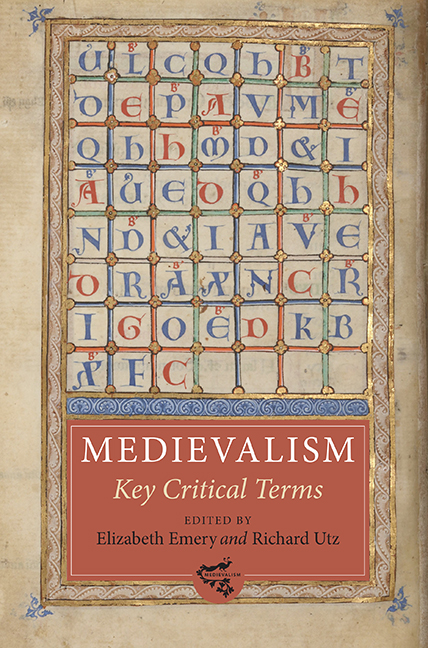Book contents
- Frontmatter
- Dedication
- Contents
- List of Illustrations
- List of Contributors
- Making Medievalism: A Critical Overview
- 1 Archive
- 2 Authenticity
- 3 Authority
- 4 Christianity
- 5 Co-disciplinarity
- 6 Continuity
- 7 Feast
- 8 Genealogy
- 9 Gesture
- 10 Gothic
- 11 Heresy
- 12 Humor
- 13 Lingua
- 14 Love
- 15 Memory
- 16 Middle
- 17 Modernity
- 18 Monument
- 19 Myth
- 20 Play
- 21 Presentism
- 22 Primitive
- 23 Purity
- 24 Reenactment
- 25 Resonance
- 26 Simulacrum
- 27 Spectacle
- 28 Transfer
- 29 Trauma
- 30 Troubadour
- Index
- Medievalism
16 - Middle
Published online by Cambridge University Press: 08 October 2022
- Frontmatter
- Dedication
- Contents
- List of Illustrations
- List of Contributors
- Making Medievalism: A Critical Overview
- 1 Archive
- 2 Authenticity
- 3 Authority
- 4 Christianity
- 5 Co-disciplinarity
- 6 Continuity
- 7 Feast
- 8 Genealogy
- 9 Gesture
- 10 Gothic
- 11 Heresy
- 12 Humor
- 13 Lingua
- 14 Love
- 15 Memory
- 16 Middle
- 17 Modernity
- 18 Monument
- 19 Myth
- 20 Play
- 21 Presentism
- 22 Primitive
- 23 Purity
- 24 Reenactment
- 25 Resonance
- 26 Simulacrum
- 27 Spectacle
- 28 Transfer
- 29 Trauma
- 30 Troubadour
- Index
- Medievalism
Summary
THE TERMS WE use to describe periods of time are obviously crucial as they do not simply describe a period but impute a character to it. It is not possible to refer to a “renaissance” or “the Dark Ages” without suggesting something about the nature of the designated period. Indeed, these terms are obviously more precise about the character of the periods designated than their chronological limits. It is for this reason that we hear more about the “early modern period” in scholarship today than the “Renaissance,” and in the same vein, scholars have stopped using “Dark Ages,” preferring the more chronologically oriented “early Middle Ages.” But even the language of “early” and “late” is not without wider implications than the simply chronological: when we speak of the “High Middle Ages” it is difficult not to think that this must be the Middle Ages par excellence, while by contrast, an “early” Middle Ages is possibly primitive, and a “late” Middle Ages possibly decadent.
Another reason for wariness about periodizing terms is that, having established when they came into use, we can often privilege that moment as originary, when in truth the moment is usually one of confirmation or culmination rather than inauguration. For example, the adjective “medieval” was first used in print around 1817, appeared sporadically in the 1820s, and was standard in the 1830s. But this should not be taken as suggesting that something new was going on. Quite the opposite: a new word had been found to describe a very precise phenomenon which had been in evidence for some decades. Likewise, the precise moment at which it became possible to discuss the “Middle Ages” was not the end of a process, and still less the beginning: it was simply a stage in a long process of the fashioning of the idea of a historical period.
With these things in mind, I want to summarize here some of the key moments for the terminology surrounding medieval studies, medievalism studies, and their objects of inquiry. I hope to bring some clarity to the field by gathering together the salient aspects in one place. Naturally, I draw heavily on and am gratefully indebted to the Oxford English Dictionary (OED) in its online edition (though I do not draw on it uncritically).
- Type
- Chapter
- Information
- Medievalism: Key Critical Terms , pp. 141 - 148Publisher: Boydell & BrewerPrint publication year: 2014

